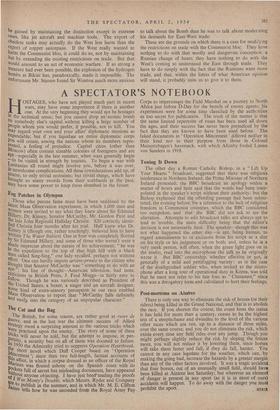The British, for some reason, are rather good at ruses
de guerre, and in the last war the ultimate success of Allied .ttrategy owed a surprising amount to the various tricks which ri,ere practised upon the enemy. The story of some of these M'cks will never be told, but the attempt to impose, in per- ttllitY, a security ban on all of them was doomed to failure. 1950 the Admiralty tried to suppress Operation Heartbreak, 6 short novel which Duff Cooper based on Operation 14, cemeat '; since then two full-length, factual accounts of Is affair, in which a corpse dressed as an officer of the Royal arines was floated ashore on the Spanish coast with its pockets full of secret but misleading documents, have appeared Without out anyone objecting. I have Just beetibreading the proofs o i Was Monty's Double, which Messrs. Ryder and Company antes to publish in the summer, and in which Mr. M. E. Clifton 4tues tells how he was seconded from the Royal Army Pay Corps to impersonate the Field Marshal on a journey to North Africa just before b-Day for the benefit of enemy agents; his experiences were for some time classified by the authc.rities as 'too secret for publication. The truth of the matter is that the same limited repertoire of ruses has been used all down the ages, and their success has never been prejudiced by the fact that they are known to have been used before. The faked documents in ' Operation Mincemeat ' differed neither in their kind nor in their purpose from those in colonel Meinertzhagen's haversack, with which Allenby fooled Liman von Sanders in 1918.


















































 Previous page
Previous page